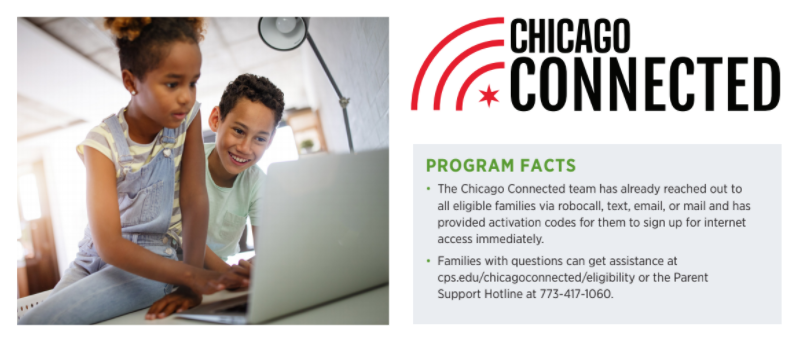How COVID-19 has widened the digital divide and how ACT is working to address it
By: Alicia Plomin, Marketing & Development Manager at Austin Coming Together
Originally published in 12/16/20 issues of Austin Weekly News and Wednesday Journal newspapers
Forced into remote learning, already vulnerable students are falling farther behind because of the ‘digital divide.’ There is a stark inequity inhibiting those without internet or devices from accessing everything from basic education and jobs, to healthcare and safety information. This divide stood out as an important issue early in the COVID-19 crisis and has since been getting worse, becoming an immediate, critical area of need.
There are startling connectivity gaps across Chicago. Just in terms of youth, 1 in 5 kids under the age of 18, approximately 110,000 children, lack access to broadband.
Austin, with the city’s largest geographic community and a population near 97,000, has the largest number of disconnected families. Kids First Chicago (K1C), an education and parent advocacy organization, released a report in the spring that stated Austin has nearly 8,000 kids without access to the internet, the most of anywhere in the city.
Chicago Connected
To address this serious issue, K1C spoke with Austin Coming Together (ACT), a community-based organization working to increase access to the resources Austin residents need to thrive. K1C then established a sponsored internet services program for high-need communities and families. The work of K1C and ACT helped inspire the city to create the Chicago Connected Initiative, a groundbreaking program designed to provide free high-speed internet service and digital literacy to approximately 100,000 Chicago Public Schools (CPS) students citywide for the next four years.
ACT’s mission has been anchored in the power of community and collaboration since their 2010 inception. This led to ACT being selected as the lead Community Based Organization Partner in Austin for Chicago Connected.
Expertise facilitating collaboration has enabled ACT to leverage their network unlike any other community. Their Austin Community Hub team is working to mobilize member organizations and other engagement partners to expand digital literacy support for students and families over the next several months. Plus, ACT looks to these partner networks to help identify areas and populations of greatest need, as well as to stay current on what resources are available.
A grand challenge
In-person connection is decreasing and the digital divide is widening. Not only is it affecting CPS students, but people of all ages — adults working or learning from home or on the job hunt, or even seniors who need critical health information or virtual doctor’s appointments.
The grand challenge of scaling this effort is there simply are not enough resources to meet the needs.
The digital divide is an issue that has been magnified; but it’s not new. I was on a team almost ten years ago that focused on broadband access and adoption in response to this issue then. Even as a lead agency, we recognize that this is an issue bigger than a single organization can handle.” — Shavion L. Scott, Director of Strategic Initiatives at ACT.
Collaboration is key
To date eight organizations are now working together to support Chicago Connected outreach efforts to reach up to 11,500 households in Austin. They include:
- Austin Childcare Providers’ Network (ACPN)
- Project Exploration
- Austin Coming Together (ACT)
- Helping Our People Excel (HOPE) CDC
- What About Us Charitable Enterprises
- Vessels Unto Honor Ministry
- Life Changing Community Outreach (LCCO)
- BUILD Inc.
A few additional organizations are prepared to come alongside us to support digital literacy efforts at both basic and advanced levels in the coming weeks and months.
Where the world is right now, being digitally connected is a necessity for everyone, regardless of race, income, or geographic location. Getting everyone connected will take a consistent, collaborative approach over time.
Facts about Chicago Connected
- The Chicago Connected team has already reached out to all eligible families via robocall, text, email, or mail and has provided activation codes for them to sign up for internet access immediately.
- Families with questions that do not have access to the online Chicago Connected website or eligibility can get assistance at: cps.edu/chicagoconnected/eligibility
- The Parent Support Hotline is 773-417-1060.
Read more about ACT’s work in Austin:

